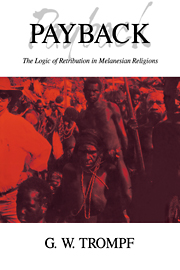Book contents
- Front Matter
- Contents
- Illustrations and tables
- Preface
- Abbreviations
- Preliminaries: The Theory of Retributive Logic
- Part One 'TRADITION'
- Part Two 'CARGO CULTISM'
- Part Three 'MODERNIZATION'
- Chapter 7 Recrimination—in ‘Modern’ Guises
- Chapter 8 Making Money and Modernizing Reciprocities
- Chapter 9 Money, Morals, Meaning: Old Logics, New Retributions?
- Conclusions and Recommendations
- Bibliography
- Index of Melanesian Cultures
- General Index
Chapter 8 - Making Money and Modernizing Reciprocities
Published online by Cambridge University Press: 22 September 2009
- Front Matter
- Contents
- Illustrations and tables
- Preface
- Abbreviations
- Preliminaries: The Theory of Retributive Logic
- Part One 'TRADITION'
- Part Two 'CARGO CULTISM'
- Part Three 'MODERNIZATION'
- Chapter 7 Recrimination—in ‘Modern’ Guises
- Chapter 8 Making Money and Modernizing Reciprocities
- Chapter 9 Money, Morals, Meaning: Old Logics, New Retributions?
- Conclusions and Recommendations
- Bibliography
- Index of Melanesian Cultures
- General Index
Summary
The heart beat of traditional Melanesian religion, we reaffirm, has been the constant round of give-and-take, and this includes positive and concessive reciprocities, not just the means and methods of enacting recrimination. It is not necessary to over-labour Melanesia's problems, considering how well the annual death toll of the region compares with other trouble-spots on the globe, and how patterns of friendly exchange and group security have already provided attractive paradigms for supra-tribal cooperation and nation building (Belshaw 1956, cf. Suter 1981 on Papua New Guinea; Taukei 1983: 11–12 on Fiji [albeit before the coups]). Principles of community care in local traditions have been steadily universalized (in some cases so radically that particular village values seem to have disappeared, as on Fiji; Cato 1956), and these neo-traditional values stand together with the Christian message of mercy and goodwill, and the international humanistic values of United Nations charters and healthy development, as platforms for less conflict-ridden and juster societies (Trompf 1986, cf. also Tanja 1982 on Islam's limited impact in the region's west).
In this section we gauge the relative effects of newer insights about ‘the better life’ especially the extraordinary impact of Christianity. In our analysis, of course, which lies under the broad rubric of ‘modernization’ we cannot forget the constant subverting of ideals.
- Type
- Chapter
- Information
- PaybackThe Logic of Retribution in Melanesian Religions, pp. 375 - 409Publisher: Cambridge University PressPrint publication year: 1994



